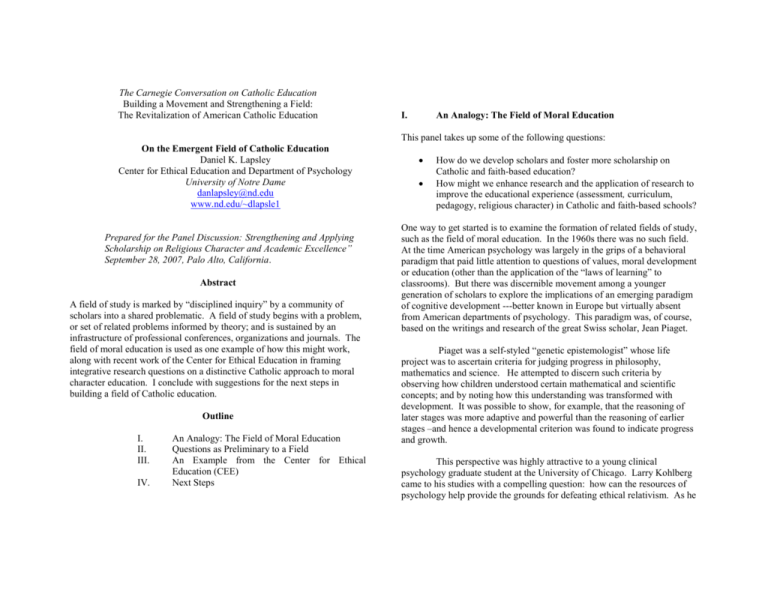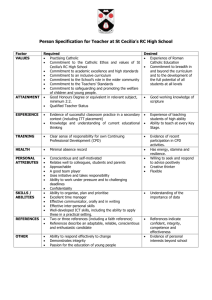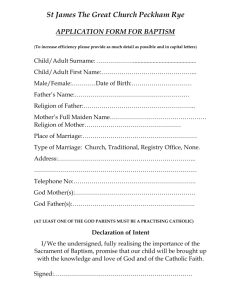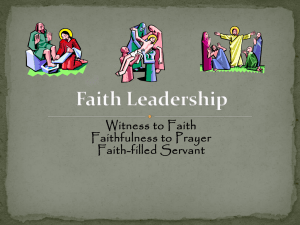The Carnegie Conversation on Catholic Education
advertisement

The Carnegie Conversation on Catholic Education Building a Movement and Strengthening a Field: The Revitalization of American Catholic Education I. An Analogy: The Field of Moral Education This panel takes up some of the following questions: On the Emergent Field of Catholic Education Daniel K. Lapsley Center for Ethical Education and Department of Psychology University of Notre Dame danlapsley@nd.edu www.nd.edu/~dlapsle1 Prepared for the Panel Discussion: Strengthening and Applying Scholarship on Religious Character and Academic Excellence” September 28, 2007, Palo Alto, California. Abstract A field of study is marked by “disciplined inquiry” by a community of scholars into a shared problematic. A field of study begins with a problem, or set of related problems informed by theory; and is sustained by an infrastructure of professional conferences, organizations and journals. The field of moral education is used as one example of how this might work, along with recent work of the Center for Ethical Education in framing integrative research questions on a distinctive Catholic approach to moral character education. I conclude with suggestions for the next steps in building a field of Catholic education. Outline I. II. III. IV. An Analogy: The Field of Moral Education Questions as Preliminary to a Field An Example from the Center for Ethical Education (CEE) Next Steps How do we develop scholars and foster more scholarship on Catholic and faith-based education? How might we enhance research and the application of research to improve the educational experience (assessment, curriculum, pedagogy, religious character) in Catholic and faith-based schools? One way to get started is to examine the formation of related fields of study, such as the field of moral education. In the 1960s there was no such field. At the time American psychology was largely in the grips of a behavioral paradigm that paid little attention to questions of values, moral development or education (other than the application of the “laws of learning” to classrooms). But there was discernible movement among a younger generation of scholars to explore the implications of an emerging paradigm of cognitive development ---better known in Europe but virtually absent from American departments of psychology. This paradigm was, of course, based on the writings and research of the great Swiss scholar, Jean Piaget. Piaget was a self-styled “genetic epistemologist” whose life project was to ascertain criteria for judging progress in philosophy, mathematics and science. He attempted to discern such criteria by observing how children understood certain mathematical and scientific concepts; and by noting how this understanding was transformed with development. It was possible to show, for example, that the reasoning of later stages was more adaptive and powerful than the reasoning of earlier stages –and hence a developmental criterion was found to indicate progress and growth. This perspective was highly attractive to a young clinical psychology graduate student at the University of Chicago. Larry Kohlberg came to his studies with a compelling question: how can the resources of psychology help provide the grounds for defeating ethical relativism. As he looked around psychology, he found that the two dominant paradigms viewed morality either as unconscious phenomena (psychoanalysis) or else as scientifically vapid unless operationally defined into terms (“positive reinforcement”) that gave comfort to relativism (behaviorism). But in Piaget’s stage theory Kohlberg found what was wanted, which developmental criteria for ascertaining when certain moral positions were inadequate. Moreover, the model of deliberative reasoning as the highest stages showed the way to forge moral consensus. For the next few decades Kohlberg and colleagues honed their assessment of moral reasoning, and articulated a “cognitive developmental approach to socialization” that immediately held out implications for education. The stage theory and its model of growth suggested certain classroom strategies for advancing moral development, including dilemma discussion and democratic participation. Seminal papers appeared in scholarly edited volumes and journals. This attracted considerable interest among a small group of Kohlberg’s students. A nascent “Association for Moral Education” was formed, with small meetings held around Boston, and then eventually at other universities. As interest grew, AME attracted other scholars so that, over the years, the association has become international, and represents more divergent and diverse perspectives on moral psychology, moral development and moral character education. AME has its own periodical (“Journal of Moral Education”), and numerous scholarly edited volumes have provided an outlet for scholarship. Moreover, opportunities for meetings, collaboration and conversation expanded to larger professional organizations, such as the American Educational Research Association, where moral education is planted as a Special Interest Group. The cumulative effect is that there is now a discernible “field of moral education” where none existed before. Several lessons can be drawn from this example. The field of moral education emerged when a determined (and charismatic) scholar made innovative use of a rich theoretical tradition to take on a set of fundamental questions that go to the very heart of our moral life. Kohlberg’s was a mind concentrated on a idea, and I think it was the very audacity of the idea, the urgency of the questions, and the powerful theoretical framework that made sense of it all, that dazzled a generation of young scholars to take up the plough in a fertile new field of discovery. I should add one more attraction, which was the prospect of applying the findings of this emergent field to the moral formation of children. The whole point of moral stage theory was to provide the conceptual grounding and pedagogy for changing the way we educate children---and this educational objective gave the field its ultimate purpose. If the analogy to moral education is apt, then it points the way to a response to the questions put to the panel: How do we foster more scholarship on Catholic education? How do we enhance research and the application of research to improve the educational experience of children in Catholic and faith-based schools? The answer is threefold: First, we must articulate fundamental questions. Like Kohlberg we must become, collectively, a” mind concentrated on an idea.” Second, we must develop, or appropriate, powerful theoretical frameworks to address fundamental questions set before us. Third, we must see in our urgency to address theoretical problems the moral purpose of our inquiry. I think the last two requirements are well in place. There does exist within the developmental and educational sciences powerful theoretical and empirical literatures to help us understand the dynamics of teaching and learning; what constitutes and how best to promote best practice instruction, curriculum development, effective school leadership, moral character formation, and more. What we know in the disciplines about learning and instruction, about effective curriculum, about school organization and leadership, applies just as well to kids in Catholic schools, and their teachers, as in secular public schools. Moreover, the very fact of our gathering here attests to the sense of urgency we all feel in improving the lot of Catholic education in America. So---theory and moral purpose we have in abundance. What we lack are fundamental questions worthy of the effort. What we lack are questions around which a field of study can coalesce. II. Questions as Preliminary to a Field: ND Task Force Insofar as problems-and-questions are preliminary to a field of inquiry, what questions should animate the emergent field of Catholic education? We know what good education looks like—but what constitutes good Catholic education? What does “Catholic,” used as an adjective, add to what we know about good education more generally? In their Final Report, Making God Known, Loved, and Served: The Future of Catholic Primary and Secondary Schools in the United States”, the Notre Dame Task Force on Catholic Education urges the building of a “ field of Catholic education” through studying how child development is nurtured in a “climate where faith is taken seriously.” Here is a good start in framing the questions preliminary to a field. How is child development nurtured in a climate of faith? Put differently, the Task Force is asking how it is possible to integrate the scholarly literatures of child development with the “climate of faith” of the Catholic tradition. How is it possible, in other words, to integrate the resources of the Catholic tradition---its metaphors, images and claims---with the theories, constructs and findings of the developmental and educational sciences---and not just for some arid academic exercise but to improve the lot of children, to enhance their moral formation, to equip them for the demands of responsible citizenship. In my view this is the dazzling “big idea” that makes common cause and shared agendas worthwhile; that attracts a younger generation of scholars to plough the field. In short, the field of Catholic education will be found at the crossroad of the Catholic tradition and the developmental and educational sciences. III. An Example from the Center for Ethical Education (CEE) I would offer the work of the ND Center for Ethical Education as an example of how a research agenda might get launched. Our deliberation began with a set of related questions. What would instructional practice look like if it was guided by the Catholic Catechism? Does the lived experience of the Christian faith, as articulated in Scripture and Catholic tradition, suggest a range of pedagogies appropriate for distinctly Catholic education? And would the “distinctly Catholic pedagogy” align with professionally responsible instructional practices as underwritten by the knowledge base of developmental and educational science? The religious identity of Catholic is distinguished (in our view) by its vision of faith community as the basis of learning, by its Trinitarian understanding of the relational basis of personal identity, and by its understanding of lived faith as “doing the truth in love” (Himes,1995). Moreover, the Catholic tradition holds out a suite of regulative concepts that articulate what the life of Christian virtue might look like, concepts such as sacrament, vocation, forgiveness, beatitudes, and agape, among others. Indeed, the Catholic identity of schools, in our view, is marked by classroom experiences that are Trinitarian, agapic, sacramental, vocational, communal, and beatific. But this explicitly religious framework finds resonance in scholarly research on the importance of school climate, the sense of community and other relational, affective features of the school experience. For example, the Trinitarian conception of God and the nature of church provide robust metaphors of community that align with psychological literatures on communal classroom and school organization. The distinctly Christian understanding of agapic love and the Catholic commitment to the sacramental principle underscores a unique vision of caring classrooms, school bonding and attachment to teacher, classroom and school community. What’s more, an education rigorously grounded on the core assumptions of the Christian faith also presents countercultural visions of how we are to relate to each other and to the community; how we approach failure, of what matters in discipline, and more. Hence the convergence of Catholic tradition and developmental science is not simply a religious gloss on what is known better by the scholarly academic literatures, but rather the religious dimension is a challenge to it. Research on Catholic education is ideally prophetic in the sense that it contributes unique perspectives on the mechanisms of effective education more generally. It serves a broad public purpose insofar as it generates models of effective educational innovation; and prepares (Catholic and non-Catholic) students for living well the life of Christian vocation and service. That said, instructional practice and educational leadership that is animated by distinctly Catholic concepts (e.g., vocation, community, sacrament, the beatitudes, agape, forgiveness, and so on) is still an evolving challenge set before the emerging “field of Catholic education.” Yet we are confident school practices that support “caring classroom communities” will provide the starting point for reflection on a distinctive Catholic pedagogy. IV. Next Steps A field of study requires more than an animating idea. Hard questions, strong theory, a motivating purpose, these are the first steps. But if moral education is any guide, the field of Catholic education requires professional structures to provide opportunities for researchers to share their work; to collaborate and develop a communal sense of shared mission and common cause. Consequently, I would urge the formation of a new professional organization of Catholic education researchers (“Association for Catholic Education Research---ACER”) that would meet annually at various Catholic universities on a rotating basis. But this is not the only place for Catholic education research to be discussed and promoted. Ultimately, the field of Catholic education should not serve narrow sectarian interests but speak to the “common good” of the educational sciences more broadly conceived. Models of Catholic school organization and practice, the proliferation of ways of instantiating the Catholic tradition as reflected in various “conceptual frameworks,” and research on these matters, will be a “prophetic” voice to the education community more generally. Hence I would recommend forming a Special Interest Group (SIG) at the American Educational Research Association. Part of the discussion that takes place in these venues must surely focus on establishing a mechanism or opportunities for researchers across various Catholic universities and colleges to collaborate on common projects; and to establish a common data base that can be accessed by interested scholars. As any pastor will attest, the sense of “community” (or of “field”) emerges as an outcome of common effort for a common goal. A field of study is a dependent variable that results from disciplined inquiry into a shared problematic. Moreover, fields of study gain legitimacy to the extent that they conform to standard notions of academic credibility, including formal structures that encourage engagement, criticism, peer review and publication. The most secure form of academic credibility is when a knowledge field is organized as an academic unit; or a professional body. Consequently, new scholarly journal(s) should be formed that focus on theoretical and empirical research; and which engages the broader academic communities in the developmental and educational sciences, including sociology and allied empirical sciences. There is, of course, an extant journal of Catholic education that meets the need for historical, theological and philosophical analysis of Catholic education. I will note in passing that the field of “music education” has no less than six journals. The field of adolescent development has at least that many. In addition to new periodicals, we should pursue scholarly edited volumes that are not driven by advocacy but rather engagement with the larger educational science community. Emergent fields attract new young scholars because the questions it asks are compelling. How does the field attract talented young students into academic preparation for advanced degrees in the field of Catholic education? In each of my eight years of teaching in Notre Dame’s Alliance for Catholic Education there always emerged a few students who decided to pursue advanced degrees in education as a result of their service and academic coursework. In this case, students were drawn to ACE teaching because of a desire to give service, but then were seduced into the “life of the mind” as a result of their academic experience in the ACE coursework. Catholic universities that prepare teachers, or encourage teaching as a service, must find ways to mentor talented and promising individuals to pursue advanced degrees in relevant educational disciplines. This includes opportunities to burnish their CVs with the appropriate research methods preparation and research experience. This might happen by treating parochial schools where our teachers are placed as “laboratory schools” or “professional development schools” where action research or other university-based research takes place, under the mentorship and direction of regular university faculty. Students should be encouraged to present findings at professional meetings and to collaborate in projects that lead to significant publication. Finally, it is not always clear how welcome a commitment to research on issues crucial to Catholic education are welcome in secular PhD-granting institutions. Moreover, one wonders if the emergence of fields of study requires a critical mass of scholars, and doctoral training, at particular institutions(s). The moral education field was centered at Harvard University, which then seeded other institutions with doctoral-level academic researchers. With this in mind, it is worth exploring whether the development of Catholic graduate schools of education makes sense.







